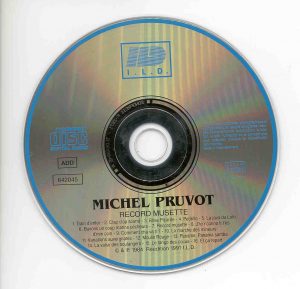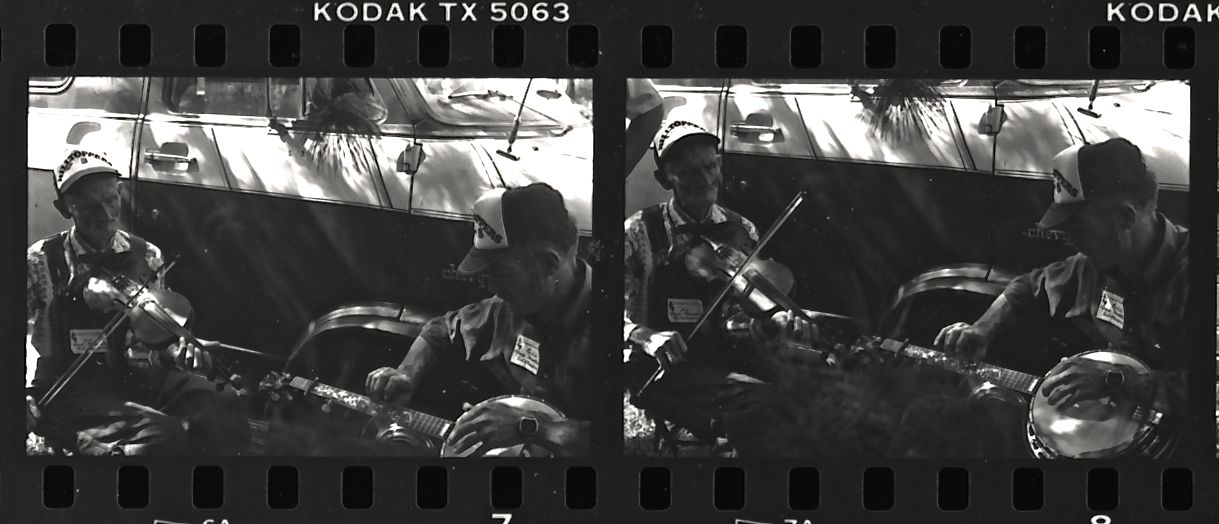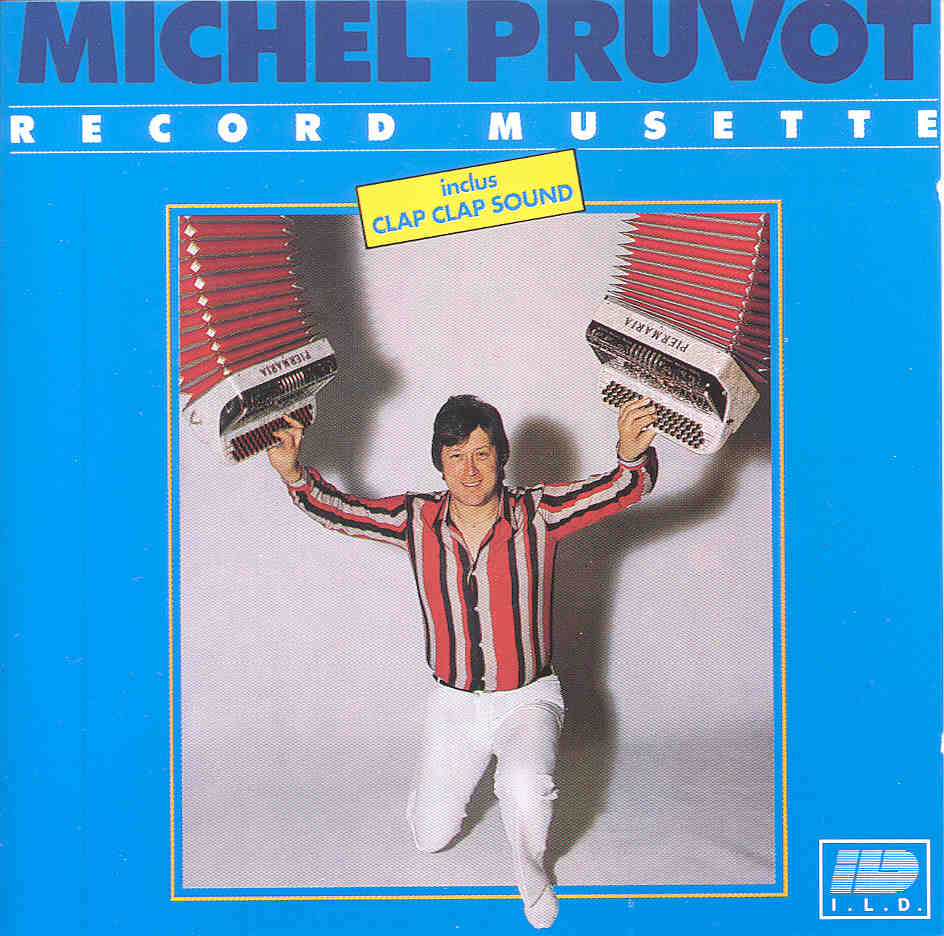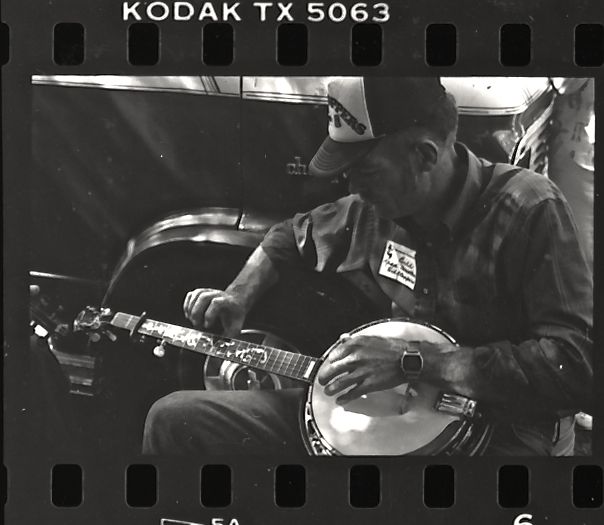The Southern Folklife Collection has just cataloged a unique collection of French accordion music CDs. Some of them are re-releases of 1930s recordings, primarily accordion-plus-big band arrangements of foxtrots and waltzes. Others come from the 1980s and 1990s and feature the instrument in genres like disco, boogie, and samba.
Especially noteworthy among this group of CDs is the 1991 reissue of the album Record Musette by accordion virtuoso Michel Pruvot (originally released in 1984). Though he is perhaps best known as the host of the French television show Sur un Air d’Accordéon (On the Accordion), Pruvot has also distinguished himself as a repeat winner of the international Accordion Endurance Competition, able to play continuously for over 117 hours.

Record Musette features a combination of original Pluvot compositions and covers. The clip included here is his interpretation of “Orange Blossom Special,” a song originally for bluegrass fiddle.
“Orange Blossom Special”
The SFC is proud to be the only repository in North America to have a cataloged copy of Record Musette.
Category: Southern Folklife Collection
SFC Spotlight: Barbara Allen, the Song Without a Single Tune

As one of the most oft-played folk ballads in the Western tradition, the commonly titled “Barbara Allen” has spawned so many variations it’s nearly impossible to identify a primary tune. Reaching the height of its popularity during the 17th and 18th centuries in the British Isles and America, the ballad has been sung in parlors and on front porches for hundreds of years. It has branched into countless forms, known variously as “Barbary Allan,” “John Armstrong’s Last Good-night,” and “The Cruelty of Barbara Allen,” among many others (Source: Francis Child’s English and Scottish Ballads ).
Charles Seeger, the renowned American musicologist (1886 –1979), visited these parlors, collecting field recordings from all over the country on a quest to locate the definitive “Barbara Allen” tune. Drawing samplings from North Carolina to Michigan to California, he selected 30 renditions to study, 15 sung by women and 15 by men. The Southern Folklife Collection houses his compilation of the recordings on the Versions and Variants of Barbara Allen , accompanied with a detailed draft brochure.
After listening to the recordings and categorizing them according to musical mode into versions and variants, Seeger concludes that “no such entity as ‘the Barbara Allen tune’ can be set up…, however, two versions have such distinct characters.” The first version sounds completely unlike any of today’s more popular recordings of the ballad because of its archaic melody. Seeger states, “Version I in the AAFS seems to bear no relationship to conventional major or minor modality and the concept of tonality.” Here is a recording of a middle-aged man singing a variant of Version Ia “Barbara Allen”:
Barbara Allen Sample 1
In contrast, the second version sounds much more pleasing to the ear because “Version II will seem…closely related to our conventional major mode.” Here is a recording of an older woman singing Version IIa:
Barbara Allen Sample 2
The lyrics of this ballad tell the haunting story of Barbara Allen’s cold rejection of a dying man’s love, and her regrets as she hears the death bell toll. Realizing her mistake, she chooses death also and is buried next to her unrequited lover. Two examples of the opening verse of the ballad include:
The red buds they were swelling
Sweet William upon his dead bed a lie
For the sake of Barbry Allen
When all the flowers were a blooming
Sweet William on his death bed lay
For the love of Barbara Allen
While the lyrics vary from recording to recording, all versions share the same central plot. But, because the story’s spirit changes as the tune evolves, listening to the 30 variants remains captivating. The differences between minor and major modes, quick or dragging tempos, and the color of each singer’s voice uncover multiple levels and moods of Barbara Allen’s tragic story. One man sings the ballad like a cautionary tale to young lovers; another woman sings as if she were Barbara Allen herself, mourning a personal experience. In this way, Charles Seeger’s Versions and Variations of Barbara Allen celebrates how a ballad is neither singular nor static but a living history of time and place.
The Banjo: Southern Roots, American Branches
BILL BIRCHFIELD OF THE ROAN MOUNTAIN HILLTOPPERS, PHOTO BY ALICE GERRARD.
The Southern Folklife Collection is pleased to announce The Banjo: Southern Roots, American Branches, Saturday, August 25, 2012. This exhibit, symposium and concert is the first of the three-part Southern Folklife Collection Instrument Series. Panels, exhibits, and concerts in 2013 will feature the pedal steel guitar and the fiddle. The series seeks to provide an opportunity for music lovers to learn from leading musicians and scholars about the music, history, and culture of the American South.
Please join us first for the banjo symposium Saturday, August 25 from 10am to 4pm in the Pleasants Family Assembly Room, Wilson Special Collections Library, UNC-CH, followed by a free concert in UNC’s Memorial Hall including master pickers Tony Trischka, Dom Flemons of the Carolina Chocolate Drops, and Riley Baugus with Kirk Sutphin. This is a free but ticketed event. Tickets are now available at the Memorial Hall Box Office, 919.843.3333.
The symposium features lectures and panel discussions on the history of the banjo with:
- Robert Cantwell, UNC Professor of American Studies; Author of Bluegrass Breakdown
- Bob Carlin, Musician and Author of The Birth of the Banjo
- Cecelia Conway, Appalachian State University Professor of English; Author of African Banjo Echoes in Appalachia
- Laurent Dubois, Duke Professor of Romance Studies and History
- Dom Flemons, musician (Carolina Chocolate Drops)
- Phillip Gura, UNC Professor of American Studies; Author of America’s Instrument: The Banjo in the 19th Century
- Jim Mills, musician (Ricky Scaggs, Vince Gill) Six time winner of IBMA Banjo Player of the Year Award.
- Stephen Wade, Musician and Author of The Beautiful Music All Around Us: Field Recordings and the American Experience
Don’t miss the accompanying exhibit tracing the history and development of the banjo, featuring instruments, photographs, recordings and ephemera from the Southern Folklife Collection.The exhibit opens August 25th and runs through Dec 31, 2012. on the 4th Floor, Wilson Library. Follow the Southern Folklife Collection on facebook or come back to Field Trip South for updates.
And now a couple more photos from the same roll as the one featured above from the Alice Gerrard Collection (#20006). These photos feature Joe and Bill Birchfield of the great family stringband from Carter, Tennessee, The Roan Mountain Hilltoppers. Bill is demonstrating his unique banjo style, playing backwards, upside-down, and left-handed.


